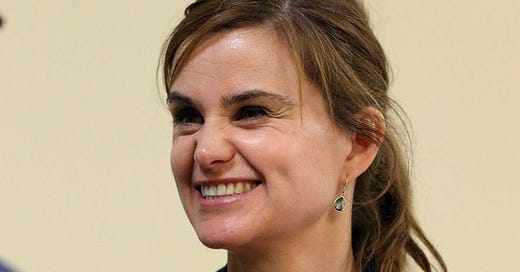Honoring Jo Cox and Melissa Hortman
Summary: Tim Dixon, co-founder of More in Common, writes about Jo Cox’s murder, whose ninth anniversary occurred this week, and the political violence in Minnesota last weekend, resulting in Melissa Hortman and her husband’s deaths.
Every time that I hear of another killing of a political leader, I am taken back to June 2016 and the feelings of hollow dread that I felt in the corridor of my office in Clerkenwell, London, when the call came: “Jo’s not going to make it.”
Two hours before, I was having lunch with Brendan Cox, the husband of British member of parliament Jo Cox, when he took a call from her office. Jo had been attacked in the street, and could he come urgently? Brendan ran out immediately. I was worried, but our brief exchange left me thinking that maybe Jo had accidentally got caught up in something, maybe intervening to protect someone. It was far, far worse.
Jo was such a spark of energy. Without ego. Passionately committed – equally to local issues and global causes. And when it came to persuading her young children to go to bed? Like a wizard.
The idea that Jo, such a force of life, was now gone felt impossible to imagine. That sleepless night, I remember feeling the urge to simply walk out the door and keep walking — as though some great journey might help make sense of the senseless.
When we heard last weekend of the murder of Minnesota State Representative Melissa Hortman and her husband, nine years almost to the day that Jo Cox was slain, I thought immediately about the shock and devastation for her family, friends and colleagues. How their lives would now be divided between the ‘before’ and the ‘after.’
I thought too about how tomorrow’s leaders in Minnesota and beyond would now have one more reason to balk at entering public life. Many will wonder if it’s even the responsible thing to do. Only a few days ago I was speaking to a columnist at one of our national mastheads who intends to step out of the public spotlight. “We get so much hate. It’s not fair to my kids.”
Democratic societies rely on people like Jo and Melissa being able to embark on public service unhindered by threats of violence. When that becomes normalized — when abuse becomes expected — we all lose.
What can we do in moments like this?
The day after Jo’s murder, a small group of her close friends came together in my office. There were many tears. But by mid-afternoon, something shifted. A kind of clarity blew through like fresh air. I can’t recall who said it first, but the question surfaced: what would Jo do now? We all knew immediately, and for the first time that day we all smiled. Jo would ask what could be done to make a difference. We couldn’t change the loss — but we could choose how to respond.
That moment changed our lives. We quit jobs, postponed plans, even moved countries. In Jo’s memory, we raised almost $3 million within a week for causes she cared about. With the help of many others, we packed out Trafalgar Square for a moving memorial concert. Her political opponents gave some of the most powerful testimonies to Jo, and some of the most generous acts. Years later, I am still meeting ordinary Brits who remark on how the nation felt galvanized and unified against extremism in the aftermath of that awful week.
More in Common was also born out of this tragedy. In her first speech in Parliament, Jo had reflected on the diversity of her own district and her country at large and concluded, “We have more in common than that which divides us.” With experience across the UK, US, France and elsewhere, we saw that her murder was not an isolated event. Polarization, division, and violence were on the rise — and they still are. We didn’t want to live in a world where people like Jo are taken, or never step forward at all.
Today, More in Common is in seven countries, with more than 70 staff, and hundreds of exceptional partners. We have a fire in our belly: to help our societies step back from escalating polarization and civic erosion. We have deep confidence in people’s ability to come together and choose connection over division. Jo is gone, but her spirit is woven into our DNA.
Lamentably, the violence in Minneapolis will not be our last. There’s a clear upward trend in threats to elected officials, even in local communities, as the Bridging Divides Initiative has shown. Social media gives far too much weight to our society’s most extreme voices.
When such moments happen, we must first stand with the grief-stricken. But we must make our own choice how we respond. Tragedy can divide and weaken us — or it can deepen our resolve. It can be a moment for retreat — or a call to action. We still have a choice.
Tim Dixon, co-founder, More in Common
Webinar Alert:
Are you part of an organization working to advance pluralism, bridge divides, or strengthen democracy —and looking to expand your reach online?
Join us for a free 90-minute webinar, Expanding the Impact of the Pluralism Movement on Social Media, on Monday, June 23rd at 2:00pm ET. Based on insights from a year-long study of the pluralism movement’s digital footprint, this session is designed for communications professionals and organizational leaders seeking actionable strategies to harness social media more strategically, boost digital impact, and make their mission resonate with new audiences.
Additional details and registration here: Zoom Registration Link
Co-hosted by More in Common, BridgeUSA, More Perfect Union, and Listen First Project.
We can’t do this without you!
MIC regularly conducts research that sheds light on both cross-group misperceptions and common ground. Consider supporting our work by making a donation.




